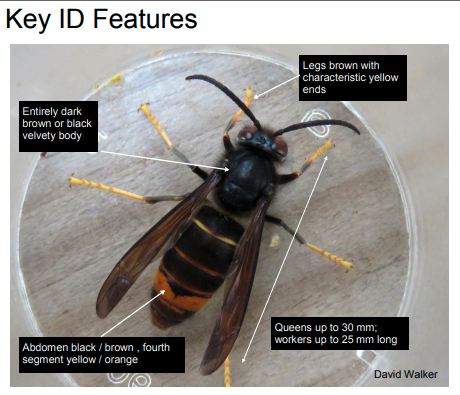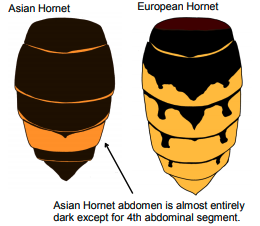Asian Hornets Will Continue to Make a Buzz in 2020
Members of the public are being warned to expect Asian hornets in the country throughout 2020 after there were 17 confirmed sightings last year.
According to the National Pest Technician Association, there are expected to be more sightings of this none native species this year, and members of the public are being advised to remain vigilant and report any sightings of the species to the UK Centre for Ecology and Hydrology.
It’s important to note that this species itself does not pose a greater risk to human health. However, the UK honeybee population is at risk.
The History
The Asian hornet first arrived in France back in 2004 after being accidentally introduced to the country. Since then, the hornets have spread like wildfire. Unfortunately, due to the sheer size of Asian hornets’ nests (thousands per nest), it’s easy for them to outnumber European hornets (hundreds per nest).
Since this introduction to France, the species has spread across Europe, and now the Asian hornet has infiltrated the UK. Last year, there were 17 sightings — the most recent sighting being in Dorset in October. There have also been sightings in:
- Kent
- Staffordshire
- Hampshire
- Surrey
- Cornwall
- Yorkshire
- Lancashire
Thankfully, there are yet to be any Nottinghamshire or Derbyshire sightings, however, Confirm A Kill is advising people to remain vigilant.
The Problems Asian Hornets Cause
As mentioned, the aggressive reproduction of Asian hornets usually allows them to have a competitive edge when it comes to food sources. This causes a risk for the current European hornet population as they are often left without food.
A hungry hornet is one that poses a significant risk, often becoming more aggressive in the search for food, and scouring areas that they would not normally go near, such as inside homes and buildings.
More crucially though, the Asian hornet is a predator of the honeybee, and with an increased hornet population — the combination of the existing European hornet and the growing population of Asian hornets — these bees are at risk. Similarly, with no indigenous predator, the Asian hornets are left to roam free unless controlled by experts.
How to Spot an Asian Hornet?
The Asian hornet is different from the native European hornet and presents identifiable differences. These are:
- A dark brown or black velvety body
- Yellow or orange bands on the fourth segment of the abdomen
- Yellow tipped legs
- Smaller (by a few cms) than the native European hornet
- Not active at night, or in colder temperatures


Above images are courtesy of the Great Britain Non-Native Species Secretariat
What Do I Do if I Spot an Asian Hornet?
Chances are, you won’t start seeing them yet. However, it won’t be long until you could see the queen hornets emerging from hibernation to find a nest this will be between January and March. This is a crucial time to stop the spread of the Asian hornet and keep the risk to the bee population at a minimum.
If you do spot them, there are three ways you can report the sighting:
- Via the Hornet Watch iPhone app
- Via the Hornet Watch Android app
- Emailing alertnonnative@ceh.ac.uk
It is important that you do not tamper with or disturb an active hornet’s nest, regardless of the species. A large number of stings could cause the body to enter a state of shock and has caused fatalities in the past. We implore you to leave it to the experts.
If you need advice about any kind of pest control, you can give us a call on 0115 913 5724.
